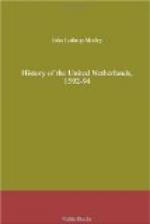This is but a sample of the dangerous stuff with which the royal mind was steadily drugged, day after day, by those to whom Farnese was especially enjoined to give his confidence.
Later on it will be seen how-much effect was thus produced both upon the king and upon the duke. Moreo, Mendoza, and Tasais were placed about the governor-general, nominally as his counsellors, in reality as police-officers.
“You are to confer regularly with Mendoza, Tassis, and Moreo,” said Philip to Farnese.
“You are to assist, correspond, and harmonize in every way with the Duke of Parma,” wrote Philip to Mendoza, Tassis, and Moreo. And thus cordially and harmoniously were the trio assisting and corresponding with the duke.
But Moreo was right in not wishing to trust the ciphers, and indeed he had trusted them too much, for Farnese was very well aware of his intrigues, and complained bitterly of them to the king and to Idiaquez.
Most eloquently and indignantly did he complain of the calumnies, ever renewing themselves, of which he was the subject. “’Tis this good Moreo who is the author of the last falsehoods,” said he to the secretary; “and this is but poor payment for my having neglected my family, my parents and children for so many years in the king’s service, and put my life ever on the hazard, that these fellows should be allowed to revile me and make game of me now, instead of assisting me.”
He was at that time, after almost superhuman exertions, engaged in the famous relief of Paris. He had gone there, he said, against his judgment and remonstrating with his Majesty on the insufficiency of men and money for such an enterprise. His army was half-mutinous and unprovided with food, artillery, or munitions; and then he found himself slandered, ridiculed, his life’s life lied away. ’Twas poor payment for his services, he exclaimed, if his Majesty should give ear to these calumniators, and should give him no chance of confronting his accusers and clearing his reputation. Moreo detested him, as he knew, and Prince Doria said that the commander once spoke so ill of Farnese in Genoa that he was on the point of beating him; while Moreo afterwards told the story as if he had been maltreated because of defending Farnese against Doria’s slanders.
And still more vehemently did he inveigh against Moreo in his direct appeals to Philip. He had intended to pass over his calumnies, of which he was well aware, because he did not care to trouble the dead—for Moreo meantime had suddenly died, and the gossips, of course, said it was of Farnese poison—but he had just discovered by documents that the commander had been steadily and constantly pouring these his calumnies into the monarch’s ears. He denounced every charge as lies, and demanded proof. Moreo had further been endeavouring to prejudice the Duke of Mayenne against the King of Spain and himself, saying that he, Farnese, had been commissioned to take Mayenne into custody, with plenty of similar lies.




